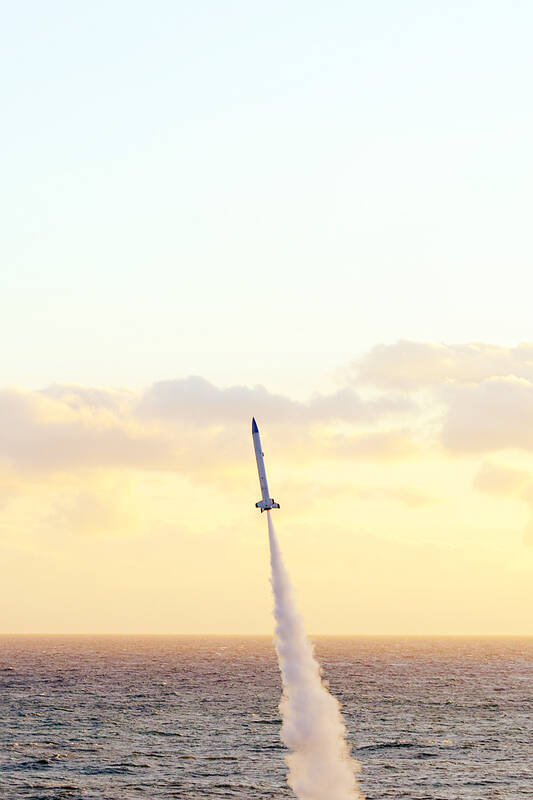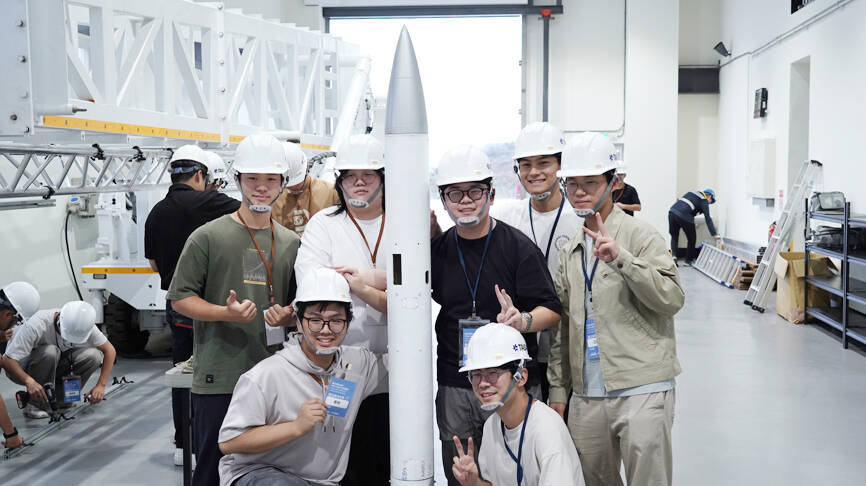The successful launch of a research rocket by the National Cheng Kung University (NCKU) yesterday at Pintung County’s Hsu-Hai Research-use Rocket Launching Area is a result of the National Science and Technology Council’s efforts to foster homegrown aerospace engineering talent within Taiwan, the Taiwan Space Agency (TASA) said.
The project is educating students to help fill gaps in Taiwan’s aerospace industry, according to TASA.
The rocket, designated “Afterlight 1,” was launched at 6:30am yesterday and was not recovered, the team said.

Photo courtesy of Taiwan Space Agency
The team comprised members from NCKU’s Department of Aeronautics and Astronautics, Combustion and Propulsion Lab, and the university’s Institute of Space Propulsion student club.
The rocket was built from fiberglass, powered by a solid fuel motor, equipped with a parachute, and was designed to reach a maximum altitude of 1km while carrying 4kg, according to professor and project head Wu Chih-yung (吳志勇).
The wind speed at the launching area yesterday morning was about 7 or 8 meters per second, and the team lowered the launch angle from 80° to 75° to compensate, he said.

Photograph courtesy of the Taiwan Space Agency
The two-section rocket was supposed to pop apart at its apogee and have the rear section land with a parachute, but the design could not be tested, as the rocket had only achieved an altitude of 761m, Wu said.
The avionics system recorded the altitude, speed, acceleration and other data, he added.
“Although we didn’t recover the rocket, our experiences have made us more capable,” the team’s safety officer and NCKU Department of Mechanical Engineering student You Chun-hung (尤鈞閎) said, adding the club is already designing the next generation of the rocket.
Since the Hsu-Hai launch area entered active commission, 11 research rockets have been launched from there, TASA said.

Nipah virus infection is to be officially listed as a category 5 notifiable infectious disease in Taiwan in March, while clinical treatment guidelines are being formulated, the Centers for Disease Control (CDC) said yesterday. With Nipah infections being reported in other countries and considering its relatively high fatality rate, the centers on Jan. 16 announced that it would be listed as a notifiable infectious disease to bolster the nation’s systematic early warning system and increase public awareness, the CDC said. Bangladesh reported four fatal cases last year in separate districts, with three linked to raw date palm sap consumption, CDC Epidemic Intelligence

The manufacture of the remaining 28 M1A2T Abrams tanks Taiwan purchased from the US has recently been completed, and they are expected to be delivered within the next one to two months, a source said yesterday. The Ministry of National Defense is arranging cargo ships to transport the tanks to Taiwan as soon as possible, said the source, who is familiar with the matter. The estimated arrival time ranges from late this month to early next month, the source said. The 28 Abrams tanks make up the third and final batch of a total of 108 tanks, valued at about NT$40.5 billion

Two Taiwanese prosecutors were questioned by Chinese security personnel at their hotel during a trip to China’s Henan Province this month, the Mainland Affairs Council (MAC) said yesterday. The officers had personal information on the prosecutors, including “when they were assigned to their posts, their work locations and job titles,” MAC Deputy Minister and spokesman Liang Wen-chieh (梁文傑) said. On top of asking about their agencies and positions, the officers also questioned the prosecutors about the Cross-Strait Joint Crime-Fighting and Judicial Mutual Assistance Agreement, a pact that serves as the framework for Taiwan-China cooperation on combating crime and providing judicial assistance, Liang

Reports of Taiwanese going missing, being detained or interrogated, or having their personal liberties restricted in China increased about fourfold annually last year, the Mainland Affairs Council (MAC) said yesterday. Last year, 221 Taiwanese who traveled to China were reported missing, were detained and interrogated, or otherwise had their personal freedom restricted, up from 55 the previous year, the council said. Reopening group tours to China would be risky, as it would leave travelers with no way to seek help through official channels after Beijing shut down dialogue between the associations tasked with handling cross-strait tourism, the MAC said. Taipei’s Taiwan Strait Tourism